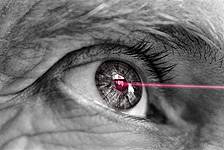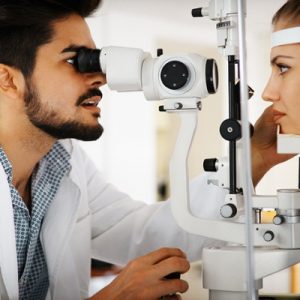Tired of wearing reading glasses? You may want to consider wearing contact lenses.
As we grow older, our vision begins to change. Almost everyone develops presbyopia (age-related farsightedness) between the ages of 40 and 50, which causes nearby vision to appear blurred – resulting in reading or computer glasses.
Presbyopia
Presbyopia is just a complex word meaning your close vision is blurred, this impacts your ability to read, clarity of the computer screen, even doing your favorite hobbies and crafts.
Reading glasses were once the only option for contact lens wearers with presbyopia who wished to read a menu or a book or do other tasks that require clear near vision.
That’s no longer the case.
There are a wide variety of contact lenses that provide people with presbyopia with clear near and far vision – without the need for reading glasses.
Contact lenses for presbyopia
There are a variety of contact lens alternatives available to help patients restore near vision. Monovision and multifocal contact lenses are two of these choices.
1. Monovision
Monovision is a vision correction method in which one eye’s contact lens corrects for distance vision while the other eye’s contact lens corrects for near vision. Each lens in monovision has its own optical power, one for close vision and the other for distance vision.
Any type of contact lens can be used for monovision. Monovision is usually very comfortable for most patients since the brain can choose the appropriate eye for the task automatically – allowing both far and close vision to be clear
However, monovision lenses can reduce depth perception, which can affect driving, especially at night, as well as the enjoyment of sports or hobbies that need accurate depth perception.
2. Multi-focal
Multifocal contact lenses allow patients to view all distances without sacrificing depth perception.
Anyone who engages in outdoor activities, frequently uses the computer, or dislikes using reading glasses to read off of their smartphone, tablet, or a newspaper may want to consider multifocal contact lenses.
However, multifocal lenses can be more difficult to adapt to and the lens needs to fit perfectly to ensure clear vision at all distances.
SEE RELATED:
If you have presbyopia, contact an eye doctor near you to discuss contact lens options.
3. Rigid gas-permeable (RGP)
RGP contact lenses are made of rigid silicone polymers that allow oxygen to reach the cornea. They keep their shape better than soft contact lenses and can often provide clearer vision.
Patients with presbyopia may benefit from RGP lenses, which come in a variety of bifocal and multifocal designs that their eye doctor can prescribe. People with presbyopia will benefit from these designs, especially if they have high levels of astigmatism.
There are a range of bifocal designs to fit different people, so having a wide range of choices is a big plus. Also, many users believe that RGP bifocals offer the best combination of close and distance acuity.
4. Orthokeratology
Orthokeratology lenses, often called ‘ortho-k’ lenses, are lenses worn overnight to reshape the cornea, making it unnecessary to wear lenses or glasses during the day.
Ortho-k can be used to correct both eyes for distance vision, as well as monovision, in which one eye is corrected for distance vision and the other eye is corrected for near vision. Your brain, just like with monovision, instinctively selects the best eye for the job.
5. Scleral lenses
Scleral contacts are large-diameter gas-permeable contact lenses that vault over the entire corneal surface and rest on the eye’s “white” sclera rather than the cornea.
For presbyopic patients, scleral contacts can be developed as multifocal contacts to correct nearsightedness and farsightedness at the same time. When compared to ordinary multifocal lenses, scleral lenses give substantially more comfort because they are firmly positioned on the eye.
LEARN MORE: Guide to Contact Lenses
If you have presbyopia and are looking into your contact lens options, contact an eye doctor near you to learn about which lenses are right for you.
If you need reading glasses, do not forget contact lenses are still a great option – these might just give you the clear and comfortable visual clarity you have been looking for.









